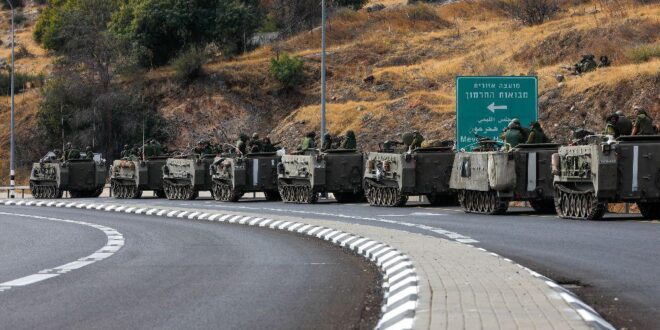Sidelined in the region, Europe is unlikely to have its voice heard amid the ongoing Israel-Hamas confrontation. Yet the EU’s economic leverage could prove useful in getting Israel and a new Palestinian leadership to negotiate in the longer term.
With the horrendous attacks of its terrorist groups on Israeli territory on the morning of October 7, the Hamas movement has stunned the world and brought an unprecedented sense of humiliation and anger over Israel. Understandably, the country is calling for revenge and a moment of national unity is prevailing as Israel’s military forces prepare to strike back in Gaza with all their might after Hamas’s murderous crimes against Israeli civilians.
Yet this moment of terror and utter astonishment that many Israeli observers compare to the shock of the terrorist attacks on 9/11 against America is also giving way to a rare feeling of vulnerability within Israeli society. Israel’s traditional military deterrence seems to have lost its clout as Tsahal (Israeli defense forces) and the intelligence services have been missing during the first hours of these attacks. More significantly, the whole geopolitical strategy displayed by the Israeli government to sideline the Palestinian issue and shore up its relations with its Arab neighbors has backfired.
Indeed, the Palestinian question, which seemed irreversibly sent into oblivion, is moving back to center stage, albeit with the risk of confusion between the legitimate rights of the Palestinian people and the use of violence by the Hamas, and with the additional risk of placing on an equal footing the Palestinian Authority in the Occupied Territories and Hamas in Gaza.
With no gratification for those Palestinians in Ramallah who were at least ready to engage in a peace process and with an aggressive Israeli policy of settlements in the West Bank as observed in the last few months, the moderates inside the Palestinian camp are perceived as the losers independently of their own shortcomings.
Meanwhile, the Hamas leaders with their positioning against any agreement with Israel have demonstrated their military strength by destabilizing the entire Israeli state. For many Palestinians—particularly the young ones—the show of force by Hamas, whatever its final outcome, has demonstrated that violence can make a difference.
At the same time, the Hamas attacks are profoundly transforming the geopolitics of the whole Middle East region, with the friends of Iran—Hezbollah, Hamas, Lebanon, and Syria—on the offensive. The ongoing discussions on Israel’s possible normalization with Saudi Arabia will probably be shelved for some time. And the other regional players who had already committed to the Abraham Accords and to an enhanced economic partnership with Israel may well prefer to keep a low profile while their own populations show their support to the Palestinian cause.
Furthermore, as the Hamas terrorists have retreated into Gaza with a high number of hostages, they look poised to force Israel into an inextricable fight with no prospect for any simple solution. The unavoidable civilian casualties in the streets of Gaza and possible hostages’ deaths resulting from this long battle to come can only stir more indignation among both the Arab and Israeli populations.
This intractable situation also runs the risk of extending the conflict to the southern borders of Lebanon, where the Hezbollah movement could open a second front in a show of solidarity with Hamas. Violence may also erupt on the West Bank, where the most radical Israeli settlers have already brought the region to an unprecedented level of tension.
As these dramatic events unfold, where does Europe stand? Could it play a useful role?
For European diplomacy, which in recent years has been gradually disappearing from the geopolitics of the region, there seems to be no room for initiative, at least for the time being. Moreover, the confusion displayed in the last two days over EU Commissioner Olivér Várhelyi’s announcement of a total suspension of all European assistance to the Palestinian people, with no distinction between the Gaza Strip and the West Bank, followed by a strong pushback from several member states, is a clear indication of the deep divisions within the union.
Despite public condemnations of the Hamas attacks by the EU as such and by all EU member states, the common approach to the Middle East Peace Process defined by the EU since the 1980 Venice Declaration is gone, largely undermined by former U.S. president Donald Trump’s initiatives on Jerusalem and the Abraham Accords.
Today, Europe is too sidelined in the region to hope for its voice to be heard amid the ongoing confrontation between Israel and Hamas. For the time being, any mediation—if there is any chance of one—between the warring parties in the Gaza Strip will come from the regional countries.
However, once the conflict is over, the need to settle at last the Palestinian question with some peace agreement between Israel and the Palestinian people will remain. Then, Europe could play a significant role by using its financial and economic leverage to convince both Israel and a renewed Palestinian leadership to get back to serious negotiations and put an end to the incessant violence.
Europe should loose no time in stating this political position and it should do so in close cooperation with its Arab partners to gain credibility. This political message may not be heard now, but it can prove to be a helpful reference when the sound and fury of the battlefield has ended.
 Eurasia Press & News
Eurasia Press & News




